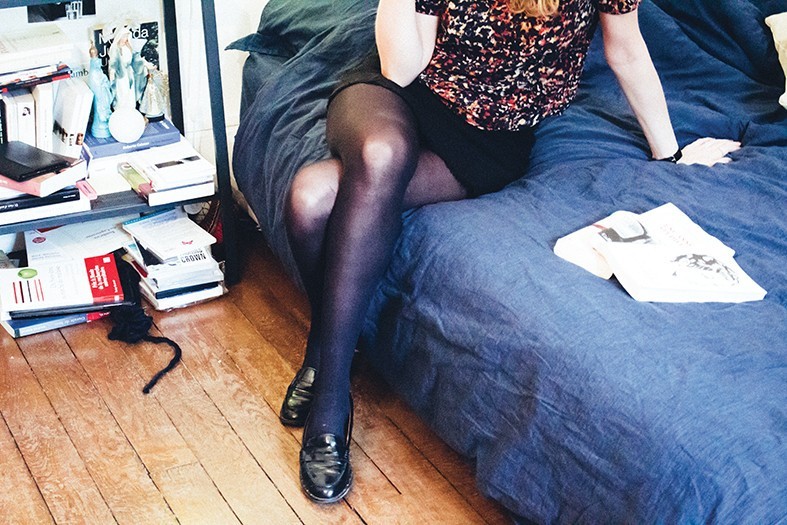
07 Nov PAULINE
Bookcase
We are in a big Parisian apartment, with four bedrooms for four young women who live together. One of them is Pauline. Her bedroom is her refuge. It’s a quiet and sheltered space. Inside, Pauline gathers her things, clothes, memories and books.
In the bookcase, books are ordered by themes, publishers and resemblances to one another – attributed resemblances mostly. It is a very personal classification and only Pauline can master it. Some of the books are exposed together, following Pauline’s rules. One DVD has found a place amongst the books: Medea by Pier Pasolini. “I am fascinated by this character”, explains Pauline, “she is such a modern, tragic heroine who wonders about her role and destiny as a woman.” Above art books hangs a letter by Roland Barthes to Antonioni, which acts as a kind of personal manifesto for Pauline: “It’s a perfect and luminous illustration of what art, creation and the artist must be. It explains my desire to read”, she says.
On Pauline’s bedside table there is a pile of books: those to read or being read. This is where the new ones, bought compulsively, go. We also notice a few damaged books: “It happens when I take them surfing with me on the French West Coast” says Pauline, who likes to have books on hand, everywhere.
Pauline likes to read and to make people read what she likes. Her books thus circulate from one bedroom to another. Some of them end up in the living room or other common areas of the apartment. They are there, for those who want to read them. Has she ever thought about moving her bookcase to the living room? In doing so she would gain some valuable space in her bedroom. “No, I don’t want to! I find it interesting to have a bookcase in the bedroom, especially if we think of all the desires that are contained in books – desires of beauty, knowledge, mystery, evasion, evocation. In the end isn’t it the best place to keep books?”
Readings
Pauline goes through phases with reading but her tastes are constant: novels, and books on poetry, theatre, and art. It is an endless cycle. At the moment, she is very interested in the theatrical work of Angelica Lidell, which she appreciates for the pure poetic rage it expresses. “I’m experiencing Stendhal’s syndrome with Lidell”, laughs Pauline. In literature she looks for meaning rather than for stories. “I like rite of passage novels that question the world and invite you to think” she says, looking at her bookcase. She is interested in the aesthetic and psychological aspects of books, and in metaphors and fables as well. She grabs La bella estate by Italian author Cesare Pavese: “this might be my book of reference!” Up on the shelves she finds Une année studieuse by Anne Wiazemsky – about the author’s marriage with French director Jean-Luc Godard when she was 20 – “the perfect guide for young women”, according to Pauline. Smiling, she reaches for an art book by French artist Sophie Calle: Prenez soin de vous. It’s about a breakup letter: “Ideal to face heartache”.
Protection
Even when she doesn’t like a book, Pauline likes to finish it, perhaps for the author. She remembers one 31st of December when, all ready to go, with her coat on and a bottle of champagne in hand, she was rushing to finish a novel, before going to a New Year’s Eve party. This novel, whether a gift or a purchase she can’t remember now, wasn’t appealing to her, and she couldn’t imagine starting the year with it. “We have to know how to protect ourselves from our own books!”
A FEW BOOKS TO BORROW FROM PAULINE:
Astragal by Albertine Sarrazin, New Directions: to be discovered or re-discovered, especially in its latest edition with a preface by Patti Smith.
How Should A Person Be? A Novel from Life by Sheila Heti, Picador: “a treasure!”
La bella estate by Cesare Pavese, Einaudi
Prenez soin de vous by Sophie Calle, Actes Sud: the perfect gift for 20-year-old women.
A Lover’s Discourse: Fragments by Roland Barthes, Vintage



